|
|
|
Sort Order |
|
|
|
Items / Page
|
|
|
|
|
|
|
| Srl | Item |
| 1 |
ID:
075228
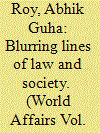

|
|
|
|
|
| Publication |
2006.
|
| Summary/Abstract |
In a global system in which economic liberalism reigns supreme, law can only become an instrument to facilitate trade, as the internationalisation of intellectual property rights shows. Abhik Guha Roy points out that the legal system is increasingly used in the service of dominant business interests at the expense of true social justice. Will this evolution of legal concepts lead to a worldwide revolt against the contemporary notion of law?.
|
|
|
|
|
|
|
|
|
|
|
|
|
|
|
|
| 2 |
ID:
159814
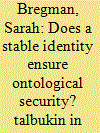

|
|
|
| 3 |
ID:
123620
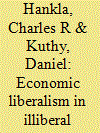

|
|
|
|
|
| Publication |
2013.
|
| Summary/Abstract |
Over the last few decades, a vast literature has emerged examining the relationship between democratic political institutions and trade policy outcomes. While this literature has added significantly to our knowledge, it has effectively ignored policymaking in dozens of important states-those that remain autocratic. This paper fills that hole by exploring the effects of authoritarian variation on national trade policies. Our contention is that more institutionalized authoritarian regimes will tend to adopt more open trade policies. This relationship should hold, we argue, for two distinct reasons. First, we argue that autocratic regimes with larger "selectorates" should have greater incentives to provide public rather than private goods. As a result, we expect that multiparty, and to a lesser extent single-party, autocracies will tend to prefer more open trade policies than non-party (often personalistic) dictatorships, monarchies, and military juntas. Second, we contend that more stable autocratic regimes will have longer time horizons and therefore greater incentives to adopt policies, such as trade openness, that may strengthen long-run economic performance. We find strong support for these arguments using several cross-national time-series models of all autocracies ranging from 1962 to 2007 (contingent on data availability).
|
|
|
|
|
|
|
|
|
|
|
|
|
|
|
|
| 4 |
ID:
075220


|
|
|
|
|
| Publication |
2006.
|
| Summary/Abstract |
Political scientists, sociologists, and economists have all sought to analyze the spread of economic and political liberalism across countries in recent decades. This article documents this diffusion of liberal policies and politics and proposes four distinct theories to explain how the prior choices of some countries and international actors affect the subsequent behavior of others: coercion, competition, learning, and emulation. These theories are explored empirically in the symposium articles that follow. The goal of the symposium is to bring quite different and often isolated schools of thought into contact and communication with one another, and to define common metrics by which we can judge the utility of the contending approaches to diffusion across different policy domains.
|
|
|
|
|
|
|
|
|
|
|
|
|
|
|
|
| 5 |
ID:
120738
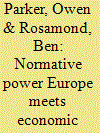

|
|
|
|
|
| Publication |
2013.
|
| Summary/Abstract |
This article offers a reading of 'normative power Europe' (NPE) suggesting that the concept has been used for two distinct purposes: as a distinctive ontological characterisation of the EU, on the one hand, and as a critical approach to the study of the EU and its external projection, on the other. These positions are labelled 'NPE ontological reality' (NPE-OR) and 'NPE critical ontology' (NPE-CO), respectively, and this article sets out to show how they might work together in practice, even if they are incommensurable in theory. It is argued that NPE's ethico-political value resides in the extent that it embodies an ontologically plural reality, never entirely defined. By drawing attention to a blind-spot in the NPE position - the constitutive importance of economic liberalism ('market cosmopolitanism') to the EU's post-Westphalian character - attention is drawn to the normative basis of market cosmopolitanism and its connections to NPE-OR are described. It is argued that, from an NPE-CO perspective, we should exercise caution in celebrating NPE-OR as post-Westphalian reality to the extent that it is rooted in a market cosmopolitics.
|
|
|
|
|
|
|
|
|
|
|
|
|
|
|
|
| 6 |
ID:
099850
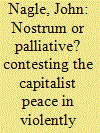

|
|
|
|
|
| Publication |
2010.
|
| Summary/Abstract |
In recent years the assumption that democracy automatically generates peace has been critiqued. It has instead been suggested that the promotion of economic liberalism provides a much stronger basis for peace. In this paper, we examine and contest the normative claims of the 'capitalist peace'. While there is a close association between extreme poverty and the onset of civil war, it is unclear whether economic liberalism will ameliorate conflict. A major reason for this ambiguity is because the emphasis of the 'capitalist peace' literature has largely been on interstate relations rather than intrastate ethnonational conflict. A closer look reveals that neoliberal policies in divided societies can also, in some contexts, exacerbate conflict in violently divided societies.
|
|
|
|
|
|
|
|
|
|
|
|
|
|
|
|
| 7 |
ID:
118953
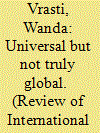

|
|
|
|
|
| Publication |
2013.
|
| Summary/Abstract |
This article responds to issues raised about global governmentality studies by Jan Selby, Jonathan Joseph, and David Chandler, especially regarding the implications of 'scaling up' a concept originally designed to describe the politics of advanced liberal societies to the international realm. In response to these charges, I argue that critics have failed to take full stock of Foucault's contribution to the study of global liberalism, which owes more to economic than political liberalism. Taking Foucault's economic liberalism seriously, that is, shifting the focus from questions of natural rights, legitimate rule, and territorial security to matters of government, population management, and human betterment reveals how liberalism operates as a universal, albeit not yet global, measure of truth, best illustrated by the workings of global capital. While a lot more translation work (both empirical and conceptual) is needed before governmentality can be convincingly extended to global politics, Foucauldian approaches promise to add a historically rich and empirically grounded dimension to IR scholarship that should not be hampered by disciplinary admonitions.
|
|
|
|
|
|
|
|
|
|
|
|
|
|
|
|
| 8 |
ID:
121909
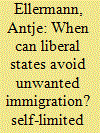

|
|
|
|
|
| Publication |
2013.
|
| Summary/Abstract |
Advanced democracies, it is commonly argued, are unable to prevent unwanted immigration because their sovereignty is "self-limited" by virtue of their normative, legal, and economic liberalism. This article challenges this claim by examining a critical test case that is at the heart of self-limited sovereignty arguments: guest worker recruitment in postwar Switzerland and West Germany. The author shows that, contrary to conventional wisdom, the unintended settlement of guest workers was not a universal given but instead was far less extensive in Switzerland than in West Germany. This difference in exposure to unwanted immigration, she argues, was the result of path-dependent processes that can be traced back to the inception of each country's recruitment program. Whereas West German officials made no concerted effort to control settlement until the program's termination, Swiss policy from its beginning was marked by state-enforced worker rotation and the prevention of family unification. To account for these critical differences in policy design, the article argues that each guest worker system was fundamentally shaped by two sets of factors. First, program design varied depending on whether or not political elites could draw policy lessons from past experience with temporary worker programs. Where past recruitment had resulted in unwanted settlement, as had been the case in Switzerland, political elites sought to adopt policy provisions designed to prevent the past from repeating itself. Where past policy failure was absent, as was the case in West Germany, policymakers were less concerned with preempting settlement. Second, recruitment policy reflected the degree to which policymakers were able to operate autonomously from cross-cutting interests. Whereas the West German government could pursue recruitment relatively insulated from both business and popular pressure, Swiss policymakers had to repeatedly accommodate both sets of actors, in the process devising a recruitment system firmly premised on the principle of worker rotation.
|
|
|
|
|
|
|
|
|
|
|
|
|
|
|
|
|
|
|
|
|